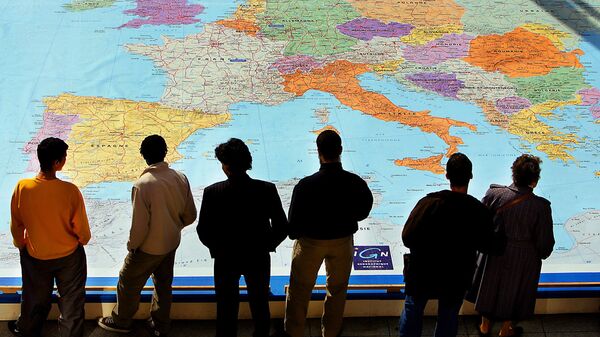In his analysis of the relationship between Europe and the US, Joseph S. Nye, a former US assistant secretary of defense and chairman of the US National Intelligence Council, has come to a conclusion that “neither a strong US nor a strong Europe threaten the vital or important interests of the other. But a Europe that weakens in 2016 could damage both sides.”
“The key question in assessing Europe’s power resources is whether the EU will retain enough cohesion to speak with a single voice on a wide range of international issues, or remain a limited grouping defined by its members’ different national identities, political cultures, and foreign policies,” he writes in his article for the Project Syndicate website.
“European unity faces significant limits. National identities remain stronger than a common European identity. Right-wing populist parties have included EU institutions among the targets of their xenophobia.”
Among other dangers to the EU stability, the author explains, is the limited integration of foreign and defense policy within the EU, as well as the possible exit of Britain from the EU, which would certainly cause a “severe impact on European morale.”
“In 1900, Europe accounted for a quarter of the world’s population. By the middle of this century, it may account for just 6% – and almost a third will be older than 65.”
And even though the current immigration wave could be a solution to Europe’s demographic problem, it certainly threatens European unity, as the political backlash to the process has been quite sharp, due to the rapid rate of the inflows and the Muslim background of the majority of the newcomers.
All the above puts American geopolitical interests at stake.
“Europe retains impressive power resources and is a vital interest for the United States,” the author states.
First of all, because its economy is equal to that of the US, and its population is considerably larger than that of America’s.
In terms of military resources, the author explains, Europe spends less than half of what the US allocates to defense, but has more men and women under arms. Britain and France possess nuclear arsenals and a limited capacity for overseas intervention in Africa and the Middle East. Both are active partners in the airstrikes against Daesh, also known as the Islamic State.
“As for soft power, Europe has long had wide appeal, and Europeans have played a central role in international institutions. According to a recent study by the Portland Group, Europe accounted for 14 of the top 20 countries. The sense that Europe was uniting around common institutions made it strongly attractive for the EU’s neighbors, though this eroded somewhat after the financial crisis.”
One cannot ignore the size and attractiveness of the European market to the US, even though the “American firms seeking to merge have had to gain approval from the European Commission as well as the US Justice Department.”
“In the cyber world, the EU is setting the global standards for privacy protection, which US and other multinational companies cannot ignore.”
So, the author states, for the US, the danger is not a Europe that becomes too strong, but one that is too weak.
“When Europe and America remain allied, their resources are mutually reinforcing,” he concludes.






